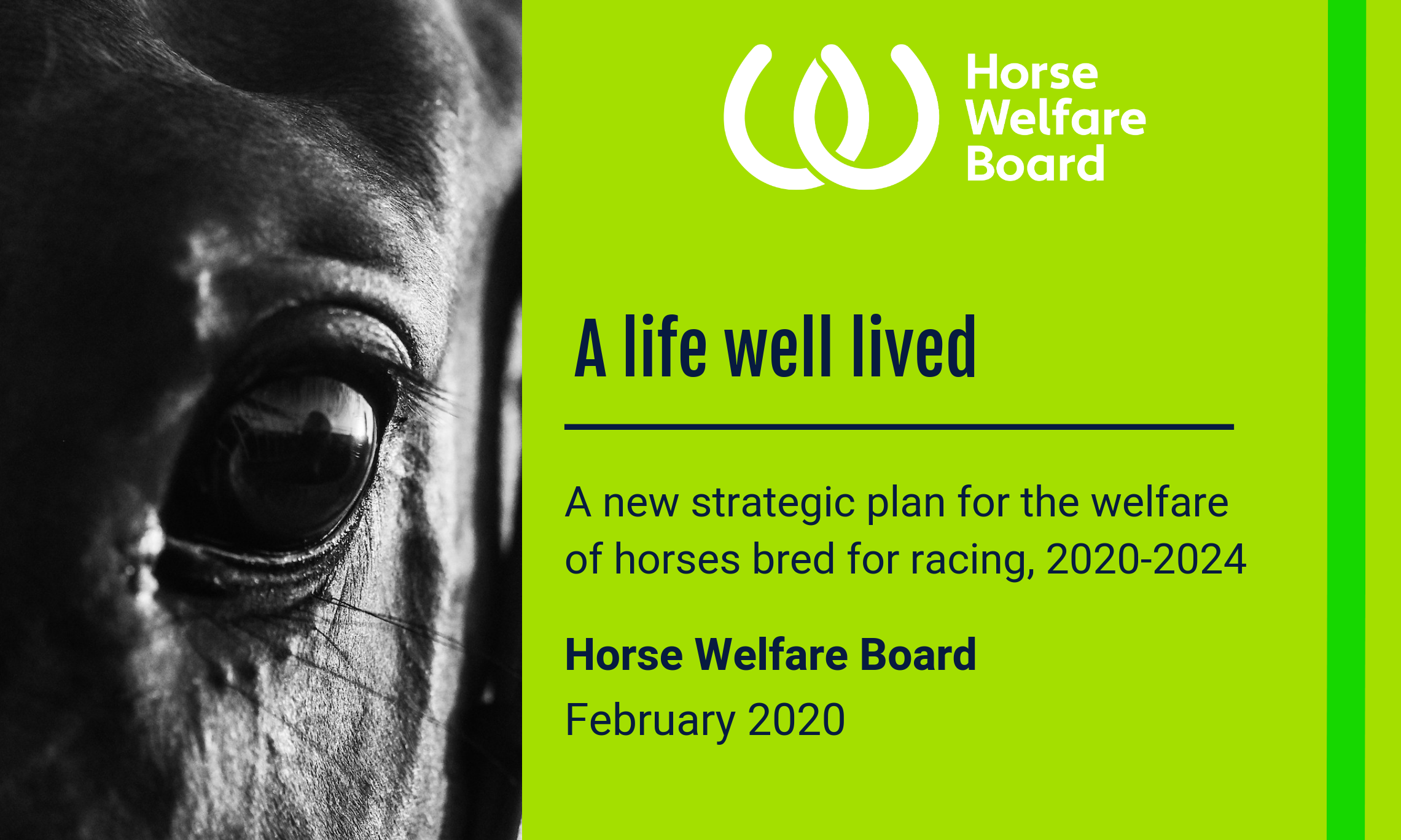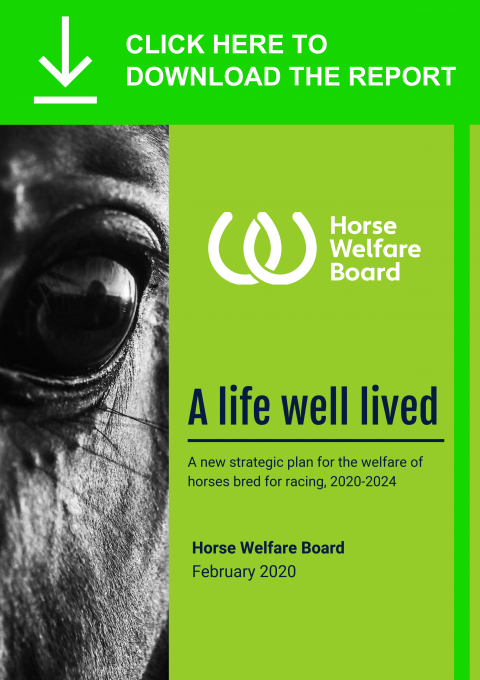
- Five-year plan focuses on vision that “Respect for the horse is at the heart of everything we do: Every horse bred for racing will enjoy a life well lived”
- Innovative project to measure horses’ quality of life and wellbeing
- Unprecedented use of data to prevent injury and manage safety
- Commitment to lifetime responsibility, based on plan to trace every racehorse from birth
Issued on behalf of the Horse Welfare Board
British horseracing’s Horse Welfare Board, which is independently chaired, has today published its five-year strategic plan for the welfare of horses bred for racing.
The strategy focuses on the ambition that every horse bred to race should lead – and be seen to lead – “a life well-lived”. The strategy includes traceability for horses bred for the sport, a strong focus on safety and wellbeing, a more confident and proactive approach to communications and the industry’s biggest ever data project.
Please click on the image below to view and/or download the strategy:

The Board recognised that the sport is already focused on horse welfare and that numerous welfare strategies exist across the sport. Trainers, racecourses, jockeys, staff and more all play their part alongside a regulatory environment based on robust inspection, licensing and training. Together, this has made racing safer for horses and jockeys and all contributes to the high quality of life enjoyed by thoroughbred horses.
However, before today the sport did not have a single, overarching welfare strategy that coordinates the contributions made by all parts of the industry, with an ambitious vision for every horse bred to race. As such, it has the full support of the BHA and its members, representing competitors and racecourses.
20 recommendations and 26 specific projects were put before British racing’s Members Committee.
The strategy focuses on four key outcomes:
- Best possible QUALITY OF LIFE, relating to the encouragement and furthering of best practice in all aspects of health, care, husbandry and disease control.
- Collective LIFETIME RESPONSIBILITY, incorporating, for example, traceability across the lifetimes of horses bred for racing, and initiatives fostering greater understanding, encouragement and effective enforcement of responsibility
- Best possible SAFETY, the understanding and analysis of multiple risk factors and the continuing reduction of reasonably avoidable injuries and fatalities.
- Growth and maintenance of public TRUST
The strategy also identifies the value of data in informing veterinary care and the prevention of injury and illness. It articulates the ethical case for horses’ participation in sport and leisure and the need for better use of high-impact communications to tell racing’s story. It also commits to develop a Code of Ethics to provide a transparent framework for decision-making around all aspects of a racehorse’s care and wellbeing.
The Horse Welfare Board includes representatives from the sport’s tripartite structure of the BHA, racecourses and horsemen. Its independent chair, Barry Johnson, is a former Chairman of World Horse Welfare and President of the Royal College of Veterinary Surgeons. Former Sports Minister, Tracey Crouch MP, is the other independent member. The development of the strategy was supported by funding from the Horserace Betting Levy Board (HBLB).
The Board also stressed that the strategy was just the beginning of a journey and it would evolve and develop over its five-year lifespan.

Dr J Barry Johnson DL.MRCVS
The Board’s Chairman, Barry Johnson praised the industry for its support in developing the strategy, and called for this demonstration of unity and collective responsibility to be continued through the delivery of its recommendations:
“The horse is at the core of the Horse Welfare Board’s philosophy, and our vision is one the industry should be inspired to attain. It ensures that, during the whole lifetime of the horse, all facets of its welfare are scrutinised, understood and, where possible, improved.
“Standards of care are already extraordinarily high, and the vast majority of racehorses undoubtedly lead a life well lived, but we want to be able to identify and further promote those factors that lead to the best possible quality of life for all thoroughbreds.
“We firmly believe that horses that are trained to take part in sport develop a real purpose that brings significant benefits to their wellbeing, not to mention those who care for them or ride them. Our goal is to measure these benefits where we can and communicate this better to a public that is often unfamiliar with horses.
“We know we have to show why horses have such a special place in our national life, and explain the sport’s high standards of welfare more confidently and proactively to the wider world. As part of this, the Board was delighted to support the idea of an annual event dedicated to celebrating our horses as champions and companions.
“Every single person working in racing has their part to play in helping people understand and accept our sport. We have been enormously impressed by the positive approach taken by many individuals and organisations, both within and outside racing, to the development of this important strategy and look forward to working with them as we begin the process of implementation.”
As part of the recommendations, the Board was asked to look at the rules governing the use of the padded whip in racing and the penalties for misuse.
The Horse Welfare Board considered information and data from a number of areas, including statistical data on misuse, rules and penalties in other racing nations, current scientific research, social, political and ethical considerations and analysis of recent consumer and industry surveys.
The rules were introduced in 2012 and continue to be endorsed by the government1. However, the Board believes there is a case for change and recommends that a minimum requirement is an increase in penalties for rule breaches.
However, it has first recommended that the BHA conduct a consultation seeking views from the industry and the wider public on a range of issues, including penalties and what should be classed as allowable use, mindful of the role that carrying a racing whip plays in ensuring the safety of horse and rider.
Barry Johnson added:
“This is a matter of public trust. We’d like people, especially those unfamiliar with horses, to understand and accept what’s necessary for our jockeys to race safely in a fair sporting competition’.
“It’s not about taking away the whip. Anyone who’s ridden a half-ton horse knows you need to be able to exercise control for the safety of horse and rider. This is about what should be allowable under our rules and how we penalise misuse to keep breaches to a minimum”.
The consultation should be open to the public, but any decision on the future of the whip made should be made through close collaboration with the sport. The Welfare Board made no recommendations on the overall outcome of this consultation, though the need to increase penalties is a minimum recommendation.
1”Defra is satisfied that the laws and rules in place are sufficient to restrict and limit the use of the whip in horse racing”. https://www.parliament.uk/business/publications/written-questions-answers-statements/written-question/Commons/2020-01-10/1916/
Notes to Editors
- Link to document
- Recommendations
- Summary document
- About the Horse Welfare Board
The Horse Welfare Board was established to produce a strategy that unites the whole industry and drives continuous improvement.The Board reports to the sport’s tripartite Members’ Committee, where the BHA, racecourses and participants share responsibility for the industry’s strategy and decisions not reserved to the regulator.The Welfare Board includes equal representation from the sport’s tripartite structure of horsemen, racecourses and the BHA. Its independent chair, Barry Johnson, is a former Chairman of World Horse Welfare and President of the Royal College of Veterinary Surgeons. Former Sports Minister, Tracey Crouch MP, is the other independent member.Membership of the Horse Welfare Board is as follows:
Dr Barry Johnson – Independent Chair
Tracey Crouch MP – Independent Member
Alison Enticknap – BHA Programme Director
David Sykes – BHA representative
Caroline Davies – Racecourse representative
Simon Knapp – Racecourse representative
Charlie Liverton – Horsemen representative
James Given – Horsemen representativeMore information about the Horse Welfare Board can be found here
